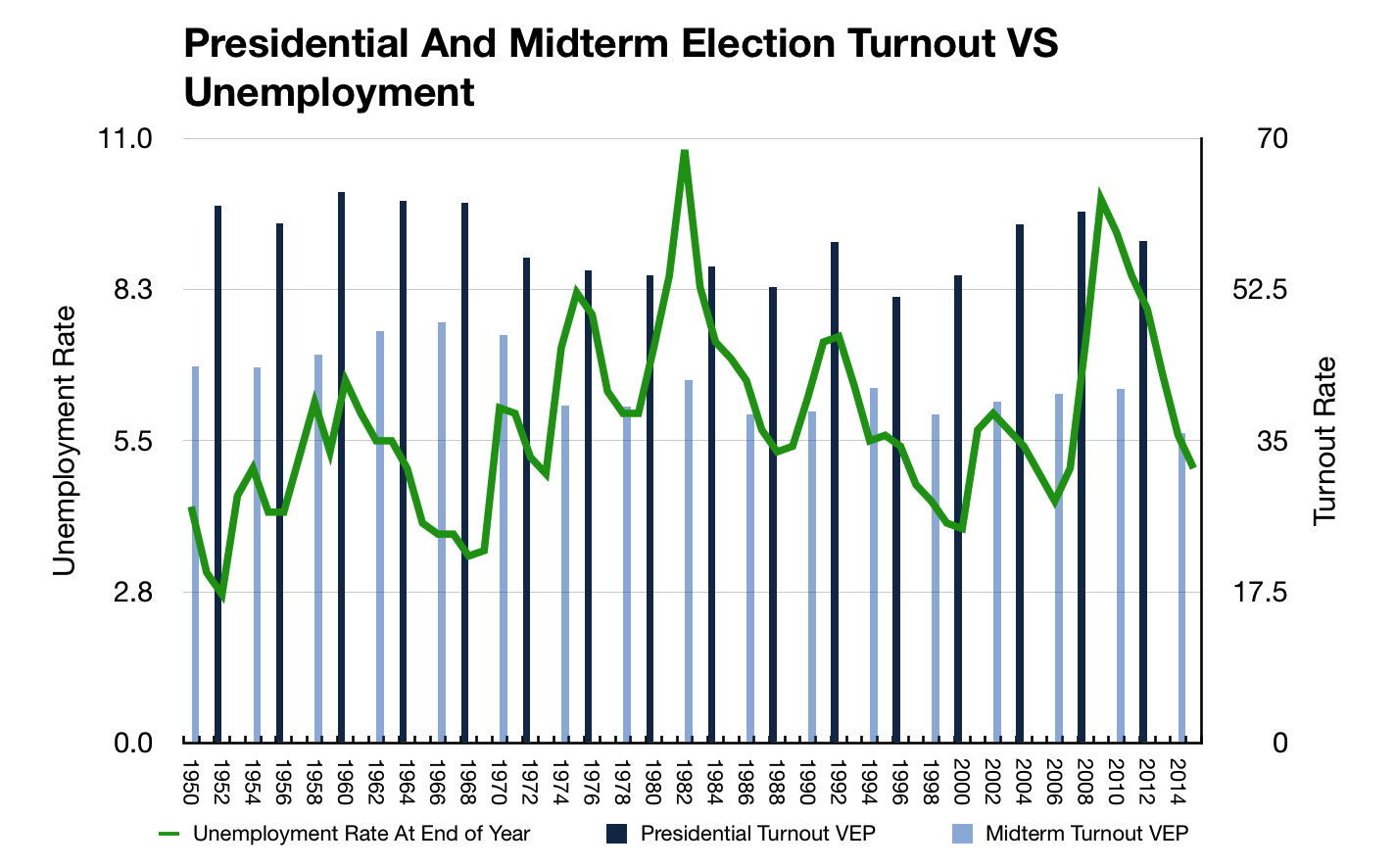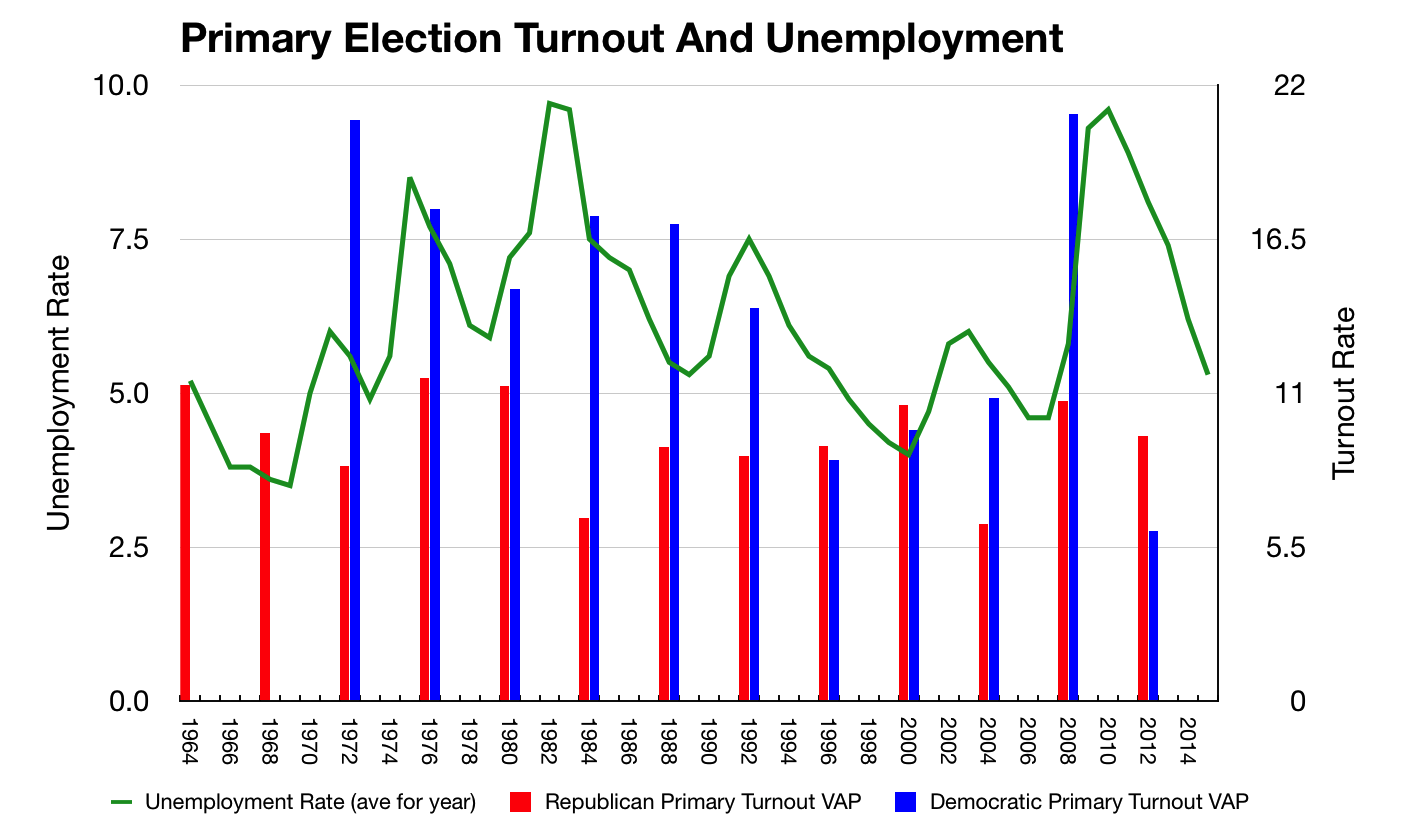Is the recovering economy actually repressing Democratic turnout?
There's an inverse relationship between the unemployment rate and voter turnout


A free daily email with the biggest news stories of the day – and the best features from TheWeek.com
You are now subscribed
Your newsletter sign-up was successful
You might have heard the Democrats have a turnout problem.
Compared to 2008 — when Democratic primary turnout broke records — turnout is down 25 percent in Iowa, 13 percent in New Hampshire, and 33 percent in Nevada. Meanwhile, the Republicans are breaking records: Their South Carolina turnout was up 20 percent from 2012, and they set new highs in Iowa and New Hampshire as well.
This is especially troublesome for Bernie Sanders, who by his own admission does better when primary turnout is high, and who has predicated his campaign on the idea that he can generate a voter wave that a more mainstream and establishment Democrat can't.
The Week
Escape your echo chamber. Get the facts behind the news, plus analysis from multiple perspectives.

Sign up for The Week's Free Newsletters
From our morning news briefing to a weekly Good News Newsletter, get the best of The Week delivered directly to your inbox.
From our morning news briefing to a weekly Good News Newsletter, get the best of The Week delivered directly to your inbox.
There are lots of ways to debate this: How much can you really compare the forces at work in primary elections to those at work in general elections? Is 2008-to-2016 really an apples-to-apples comparison? Etc.
But one thing I haven't seen many commentators focus on is the effect of the economy on turnout. So let's do that. Because it may well be that 2008 was something of a fluke thanks to the Great Recession.
It's something of an unexplored field, but research over the last few decades often suggests that a bad economy depresses voter turnout. (More so in mid-terms, which are well known for underperforming turnout in presidential elections.) The idea is that people who aren't connected to the job market are less connected to society overall, and thus less likely to participate in a big collective civic activity like voting. They're also less likely to spend time and effort voting, when they could be trying to look for work.
But more recent research takes the opposite view. In 2012, for instance, political scientists Barry Burden and Amber Wichowsky released a paper (published version here) that looked into state-, county- and individual-level voting data, and found that increases in unemployment actually drive voter turnout up: At the state level, a 2 percentage point rise in the unemployment rate correlates with a 1 percentage point rise in turnout. The effect was smaller at the county level, suggesting people pay more attention to statewide conditions.
A free daily email with the biggest news stories of the day – and the best features from TheWeek.com
Burden and Wichowsky concluded that a higher unemployment rate both drives turnout up and shrinks the turnout gap between employed voters and unemployed voters. Their idea is that the public reacts asymmetrically to the economy: They'll turn out to punish elected officials when times are bad, but won't turn out to reward them when times are good. Interestingly, the turnout gap between the employed and unemployed disappeared completely in 1992 and 2008 — both elections that occurred in the middle of recessions — suggesting that when things get bad enough, the economy can become an all-encompassing issue in the national consciousness that swamps regional differences in turnout.
That said, the data is muddied by a lot of confounding factors. Zooming out to the national level, here's a graph I put together of presidential and mid-term turnouts compared to unemployment.

Obviously this is a crude analysis on my part. But eyeballing the chart, the relationship seems weak. Yes, when spikes in unemployment coincide with an election — the 1960, 1992 and 2008 presidential races, and the 1982 mid-term — turnout does appear to tick up. But turnout was also reliably higher in mid-century, when strong employment rates were much more common, which further complicates the story.
Another 2012 political science paper by Kerwin Charles and Melvin Stephens, which used county-level data, came up with a slightly different thesis: Lower wages and lower employment rates drive up turnout, but it's because being out of work provides people more non-work time they can devote to educating themselves about elections. And the time and effort to vote is actually more costly for people with a job, since they could be at work, getting paid.
A third 2012 paper by Matthew Incantalupo contested this purely knowledge-based approach, however. Incantalupo determined that losing your job in a bad economy can motivate people to go vote, and this has a significant effect on turnout. Voluntarily quitting your job isn't going to piss you off, and if you lose your job in a good economy, you're more likely to understand it as a personal problem than an issue to be addressed by political action.
Also interesting: Charles and Stephens found that higher wages and employment lowers turnout for all races except presidential ones. This throws us back on the question of general elections versus primaries. So here's another chart I did of primary election turnout compared to the unemployment rate. (I should note that, due to limitations in the data, the earlier graph showed turnout among all people who are voting eligible (VEP), but this graph features everyone who is voting age (VAP).)

What I think is notable here is that primary turnout really does seem to respond to the economy more than general election turnout. And Democratic turnout considerably more so than Republican.
My own guess is there are a few things going on here. One, state-level primaries are big enough to grab voters' political awareness, but not so big as to be completely overwhelmed by the media ubiquity of a presidential race. Two, there are way more low-income voters in the Democratic Party than the GOP, and those are the people much more likely to get fired when the economy tanks. So maybe economic recessions and downturns motivate the Democratic coalition much more than the GOP coalition.
So maybe turnout is being suppressed because the economy is actually doing better. The primaries in 2008 were a big outlier due to the Great Recession (the downturn officially started in late 2007, a full year before the election) and now we're "regressing towards the mean" as the economy slowly recovers.
That conclusion doesn't necessarily help Sanders' case, however. As Mike Konczal put it, Sanders is a "proof of concept" candidate: a test of the idea that even in normal times, a serious leftwing populist economic push could remake the nature of American politics. A return to normal as the economy recovers is presumably what we should see with normal, establishment candidates.
That said, we're still largely in almost unprecedented waters: a grindingly slow sort-of-recovery that's stretched out seven years after the second worst economic collapse of the last century. And there are lots of factors at play besides the economy: The Republicans' blockbuster turnout might also suggest that when faced with a catastrophe like Donald Trump, a lot of voters are willing to get to the polls to shoot him down.
This is a very weird time, and November is still a ways off.
Jeff Spross was the economics and business correspondent at TheWeek.com. He was previously a reporter at ThinkProgress.
-
 Film reviews: ‘Send Help’ and ‘Private Life’
Film reviews: ‘Send Help’ and ‘Private Life’Feature An office doormat is stranded alone with her awful boss and a frazzled therapist turns amateur murder investigator
-
 Movies to watch in February
Movies to watch in Februarythe week recommends Time travelers, multiverse hoppers and an Iraqi parable highlight this month’s offerings during the depths of winter
-
 ICE’s facial scanning is the tip of the surveillance iceberg
ICE’s facial scanning is the tip of the surveillance icebergIN THE SPOTLIGHT Federal troops are increasingly turning to high-tech tracking tools that push the boundaries of personal privacy
-
 The billionaires’ wealth tax: a catastrophe for California?
The billionaires’ wealth tax: a catastrophe for California?Talking Point Peter Thiel and Larry Page preparing to change state residency
-
 Bari Weiss’ ‘60 Minutes’ scandal is about more than one report
Bari Weiss’ ‘60 Minutes’ scandal is about more than one reportIN THE SPOTLIGHT By blocking an approved segment on a controversial prison holding US deportees in El Salvador, the editor-in-chief of CBS News has become the main story
-
 Has Zohran Mamdani shown the Democrats how to win again?
Has Zohran Mamdani shown the Democrats how to win again?Today’s Big Question New York City mayoral election touted as victory for left-wing populists but moderate centrist wins elsewhere present more complex path for Democratic Party
-
 Millions turn out for anti-Trump ‘No Kings’ rallies
Millions turn out for anti-Trump ‘No Kings’ ralliesSpeed Read An estimated 7 million people participated, 2 million more than at the first ‘No Kings’ protest in June
-
 Ghislaine Maxwell: angling for a Trump pardon
Ghislaine Maxwell: angling for a Trump pardonTalking Point Convicted sex trafficker's testimony could shed new light on president's links to Jeffrey Epstein
-
 The last words and final moments of 40 presidents
The last words and final moments of 40 presidentsThe Explainer Some are eloquent quotes worthy of the holders of the highest office in the nation, and others... aren't
-
 The JFK files: the truth at last?
The JFK files: the truth at last?In The Spotlight More than 64,000 previously classified documents relating the 1963 assassination of John F. Kennedy have been released by the Trump administration
-
 'Seriously, not literally': how should the world take Donald Trump?
'Seriously, not literally': how should the world take Donald Trump?Today's big question White House rhetoric and reality look likely to become increasingly blurred
